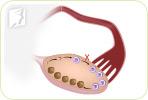
Irregular periods can be one of the many irritating symptoms of menopause. An irregular period is defined as a period that differs from your usual cycle. Irregularities can result from the fluctuation of hormones in your body as it transitions from being fertile to infertile. Your periods might occur more or less frequently than usual, be heavier or lighter, last longer or shorter, or be more or less painful.
Irregular periods can be different for every woman, and they don't just occur when a women is menopausal. The experience of irregular periods may be new and different for you, so it's natural to have questions. Common questions women have regarding irregular periods include questions about the effects of the birth control pill and fertility. Read on the answers to your irregular period FAQs.
Am I Still Fertile during Irregular Periods?
Yes, women can still be fertile even if they are experiencing irregular periods. In fact, you remain fertile until you reach menopause - the absence of menstruation for 12 consecutive months.
It is also normal to experience irregular periods during perimenopause. Perimenopause is the stage before menopause that can produce many of the symptoms women have. While you may be less fertile than in previous years, you are not completely infertile during this stage. If you wish to avoid pregnancy, continue using birth control.
What Impact Will My Pill Have on Irregular Periods?

If you are still using birth control prior to menopause, then the length of your cycle will be regular. This is because the hormones in the pills control your cycle. However, you may notice irregularities in other ways. Periods can be lighter or heavier and you may experience less or more pain than usual.
How Will I Know I'm Experiencing Menopause if I Am on Birth Control?
During the fourth week of your cycle - when you are taking a week off the pill or taking the placebo pill - you may notice a change in your period or experience other menopausal symptoms. The inactive pill does not contain estrogen, and will not supplement the body's fluctuating levels of natural estrogen. It is during this time that you may experience hot flashes, night sweats, irritability, and other menopausal symptoms. If you are taking the birth control pill and are in your 40s or 50s, it is important to be aware that you may be going through menopause. Look out for symptoms and talk to your doctor about the impact of the pill on menopause.
Sources
- Hutchinson, Susan M.D. "The Stages of a Woman's Life: Menstruation, Pregnancy, Nursing, Perimenopause, Menopause". November 2007.
- Love, Susan M.D. Menopause and Hormone Book. New York: Three Rivers Press, 2003.
- BMJ Group. "Menopause: What is it?" Patient Leaflet. 2007



